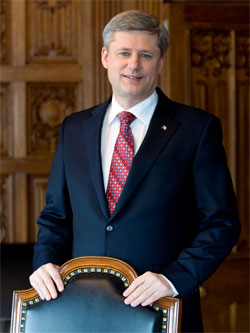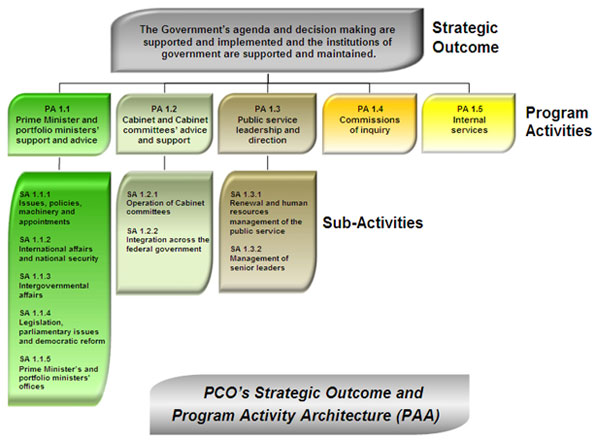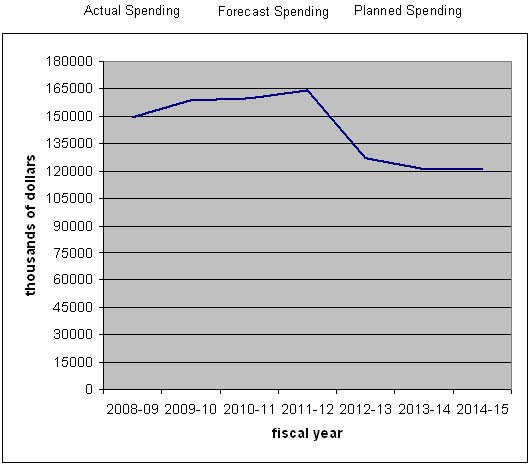Common menu bar links
Breadcrumb Trail
ARCHIVED - Privy Council Office - Report
 This page has been archived.
This page has been archived.
Archived Content
Information identified as archived on the Web is for reference, research or recordkeeping purposes. It has not been altered or updated after the date of archiving. Web pages that are archived on the Web are not subject to the Government of Canada Web Standards. As per the Communications Policy of the Government of Canada, you can request alternate formats on the "Contact Us" page.
Prime Minister's Message

Thanks to strong economic and fiscal management, including the highly successful Economic Action Plan, Canada has enjoyed one of the strongest recoveries of any advanced economy and is the only G7 country to have recovered all of the output and jobs lost during the
2008-09 global financial crisis and recession. Despite the domestic strengths of the Canadian economy, global economic uncertainty remains high and promoting jobs and growth remains the Government’s top priority.
Economic Action Plan 2012, the Government’s plan for jobs, growth, and long-term prosperity, builds on the sustainable, low-tax, growth-friendly policies put in place since 2006. The plan supports jobs and growth by investing in innovation, entrepreneurship and world-class research, responsible resource development, and training, infrastructure and opportunity.
To maintain Canada’s fiscal advantage and avoid the economic uncertainty seen in other countries, the Government will take action to reduce the deficit and return to a balanced budget over the medium term.
The Privy Council Office will assist the Government in these efforts by providing fiscal, economic and social policy advice and support to help ensure that the Canadian economy continues to grow and remain stable, and that Canada continues to be one of the most attractive countries in the world for national and international investment.
In 2012-13, the Government will continue efforts to build a fast and flexible economic immigration system and will work to expand opportunities for Aboriginal Canadians to fully participate in the economy. In addition, the Government will advance labour market participation and the health and well-being of Canadians. The Government will continue its efforts to keep Canada’s streets and communities safe.
The Privy Council Office will help the Government to achieve these and other important domestic goals by: providing professional, non-partisan policy advice; supporting the development of policy and legislative proposals to Cabinet; performing a challenge function to ensure that proposals to advance our agenda are based on comprehensive analyses; assisting with the communication and implementation of the Government’s decisions; and consulting, collaborating and coordinating efforts with domestic partners, including provinces and territories. Of particular note, in 2012-13, the Privy Council Office will continue to promote Public Service Renewal and excellence in public service management and will help the Government to follow through on its commitments to reform the Senate and strengthen the electoral system.
Finally, in 2012-13, the Privy Council Office will facilitate our leadership in promoting international trade and security, help the Government to advance the values of freedom, democracy, human rights and the rule of law, and support international efforts such as those centered in Afghanistan. The Privy Council Office will also continue to provide support and coordination for emerging issues and international crises that require the immediate attention of the Government.
I am pleased to present the 2012-13 Report on Plans and Priorities for the Privy Council Office.
The Right Honourable Stephen Harper
Prime Minister of Canada
Section I: Organizational Overview
Raison d'être
As Head of the Public Service of Canada, the Clerk of the Privy Council sets strategic direction and oversees all major issues for the Public Service. Led by the Clerk of the Privy Council, PCO helps the Government to implement its vision and respond effectively and quickly to issues facing the Government and the country.
Responsibilities
PCO provides impartial advice and support to the Prime Minister and Cabinet. Headed by the Clerk of the Privy Council and Secretary to the Cabinet, the department functions both as the Cabinet’s secretariat and as the Prime Minister’s source of public service advice on almost all policy questions and operational issues facing the Government.
PCO’s three primary roles are to:
Provide impartial advice to the Prime Minister, portfolio ministers, Cabinet and Cabinet committees on matters of national and international importance.
This includes:
- providing non-partisan policy advice and information from across the Public Service;
- consulting and collaborating with domestic and international stakeholders and partners inside and outside of government, including provincial and territorial governments;
- providing advice in support of federal-provincial-territorial relations;
- providing analysis and advice on issues related to national security, defence priorities and foreign relations;
- providing information on the priorities of Canadians;
- providing non-partisan advice and support on the development and implementation of the Government’s parliamentary, legislative and democratic reform programs;
- advising on Canada’s Westminster style of government, on government structure and organization, and on Governor-in-Council appointments; and
- managing policy, legal and operational issues related to the recruitment and appointment process for senior positions in federal departments, Crown corporations and agencies.
Ensure the smooth functioning of the Cabinet decision-making process and facilitate the implementation of the Government’s agenda.
This includes:
- facilitating the management of Cabinet and the Government of Canada on a continual basis;
- managing Cabinet’s decision-making system;
- coordinating departmental policy and legislative proposals to Cabinet, with supporting policy analysis and advice;
- providing scheduling and support services for meetings of Cabinet and Cabinet committees;
- advancing the Government’s agenda across federal departments and agencies and with external stakeholders; and
- preparing Orders in Council and other statutory instruments to give effect to Government decisions.
Foster a high-performing and accountable public service.
This includes:
- guiding policy on people management issues and Public Service Renewal; and
- building the capacity of the Public Service to meet emerging challenges and the changing responsibilities of government.
For more information on PCO’s main roles, please visit PCO’s website.
Strategic Outcome and Program Activity Architecture

Organizational Priorities
PCO’s priorities and plans for 2012-13, shown in the tables below, are closely tied to its strategic outcome: “The Government’s agenda and decision making are supported and implemented and the institutions of government are supported and maintained.”
| Priority | Type1 | Program Activities |
|---|---|---|
| Support the Prime Minister in exercising his overall leadership responsibility | Ongoing | 1.1: Prime Minister and portfolio ministers’ support and advice |
| Description | ||
|
Why is this a priority? This priority facilitates the Prime Minister’s leadership in Government decision making. Plans to meet this priority: Provide advice and support to the Prime Minister in his leadership of Government decision making. This includes advice and support on:
|
||
| Priority | Type | Program Activities |
|---|---|---|
| Focus on key policy and legislative areas and strengthen medium-term policy planning | Ongoing |
1.1: Prime Minister and portfolio ministers’ support and advice |
| Description | ||
|
Why is this a priority? This priority supports the Government’s delivery on key policy and legislative commitments and helps to advance medium-term policy planning. Plans to meet this priority: Provide advice and support to the Prime Minister, portfolio ministers, Cabinet and Cabinet committees to advance the policy and legislative agendas and to lead and coordinate efforts across government related to medium-term policy planning. This includes advice and support on:
|
||
| Priority | Type | Program Activities |
|---|---|---|
| Support management and accountability of government | Ongoing |
1.3: Public service leadership and direction |
| Description | ||
|
Why is this a priority? This priority supports the Clerk’s leadership role as Head of the Public Service of Canada and the Government’s commitment to accountability in government. Plans to meet this priority: Provide advice and support to the Clerk of the Privy Council as Head of the Public Service of Canada. This includes advice and support on:
Provide administrative and organizational support to commissions of inquiry. |
||
| Priority | Type | Program Activities |
|---|---|---|
| Strengthen PCO’s internal management practices | Ongoing | 1.5: Internal services |
| Description | ||
|
Why is this a priority? This priority supports strong internal management, which enables PCO to fulfill its mandate with excellence. Plans to meet this priority: Provide support for strong internal management of human resources, expenditures, security and risk. |
||
Risk Analysis
PCO’s everyday operating context is complex and variable. Accordingly, PCO’s risk profile is best understood in relation to those occasional circumstances that produce impacts significant enough to require substantive, new policy or management responses.
In 2012-13, PCO’s risk management strategies will be influenced by the cumulative effects of ongoing reductions in government spending. PCO’s risk mitigation efforts will focus on capitalizing on efficiencies, while safeguarding the critical assets and functions required to support Government priorities and operations.
Risks to policy responses
In 2012-13, PCO will support the Government in delivering on its policy agenda and responding to emerging policy issues. PCO will manage risks to the implementation of the Government's agenda by:
- coordinating and prioritizing policy development efforts across the larger federal policy communities, including communicating policy priorities and vetting policy proposals to ensure that new policy initiatives are complementary;
- coordinating and sharing trend monitoring and analysis work across the federal policy, intelligence and media monitoring communities, to support the development of the short- and medium-term policy agendas;
- maintaining specialized expertise in key policy areas; and
- implementing efficiencies and improvements for key secretariat advisory and support functions, including functions linked to the production and distribution of Orders in Council; access to and control of Cabinet documents; and the coordination and tabling of responses to written questions and notices of motions for the production of papers and petitions.
Risks to management responses
In 2012-13, PCO will ensure that it is positioned to support well-coordinated, efficient and effective management responses by continuing to develop its capacity to support the Government in the event of emerging issues, emergencies or crises. This includes:
- continuing to strengthen business continuity and emergency management capabilities, so that PCO is better prepared to resume critical functions and services in the event of threats, hazards, or major events that could affect the continuity of constitutional government;
- coordinating national security policy and priorities across federal government departments and agencies by working with partners to monitor trends and gather information and intelligence on emerging national and international security and defence issues and by showing leadership in galvanizing the interdepartmental security community; and
- helping to plan and coordinate Government responses to emerging issues, emergencies and crises, as required.
Improved governance, planning, and interdepartmental coordination of security, foreign and defence issues will help to ensure that PCO is able to deliver key advisory and support functions and positioned to support and coordinate responses on behalf of the Government.
Internal services risks
In 2012-13, PCO will minimize internal services risks by ensuring that human resources plans are aligned with cost containment and fiscal restraint objectives, by maintaining a state of readiness in support of critical business functions and workplace health and safety, and by advancing an integrated approach to risk management. This includes:
- operating with a focus on cost control, and adjusting human resources plans and initiatives to reflect the federal government’s cost containment and fiscal restraint objectives and to ensure alignment with the PCO Strategy for Workforce Management 2011-2015;
- advancing the integration of PCO security and emergency management program planning, enhancing the readiness posture of building emergency organizations and the emergency operations team, implementing the Departmental Security and Emergency Management Plan, and supporting the continuity of the Prime Minister’s Office and PCO critical functions; and
- consulting broadly with stakeholders to improve the identification and assessment of risks and the development of controls to mitigate them, and working to integrate risk management principles into decision-making processes.
Planning Summary
Financial Resources (thousands of dollars)
| 2012-13 | 2013-14 | 2014-15 |
|---|---|---|
| 126,767 | 121,152 | 121,076 |
Human Resources (FTEs)
| 2012-13 | 2013-14 | 2014-15 |
|---|---|---|
| 968 | 926 | 926 |
| Program Activity2 | Forecast Spending 2011-12 |
Planned Spending3 | Alignment to Government of Canada Outcomes | ||
|---|---|---|---|---|---|
| 2012-13 | 2013-14 | 2014-15 | |||
| Prime Minister and portfolio ministers’ support and advice | 73,569 | 65,463 | 62,698 | 62,700 | Strong and independent democratic institutions |
| Cabinet and Cabinet committees’ advice and support | 20,166 | 15,546 | 15,029 | 15,030 | Strong and independent democratic institutions |
| Public Service leadership and direction | 5,031 | 3,935 | 4,100 | 4,100 | Well-managed and efficient government operations |
| Commissions of inquiry4 | 12,907 | 1,250 | 0 | 0 | A transparent, accountable and responsive federal government |
| Total Planned Spending | 86,194 | 81,827 | 81,830 | ||
| Program Activity | Forecast Spending 2011-12 |
Planned Spending | ||
|---|---|---|---|---|
| 2012-13 | 2013-14 | 2014-15 | ||
| Internal services5 | 52,383 | 40,573 | 39,325 | 39,246 |
| Total Planned Spending | 40,573 | 39,325 | 39,246 | |
Expenditure Profile
Departmental Spending Trend Graph 2008-09 to 2014-15

The overall increase in spending of $10.6 million from 2008-09 to 2010-11 was mainly attributable to a combination of initiatives, including:
- the creation of a Panel of Arbiters responsible for the review of documents related to the transfer of Afghan detainees by the Canadian Forces;
- the payment of severance pay, other salary-related items such as parental leave, and contributions to employee benefit plans;
- measures taken to address operating requirements and to reduce various chronic funding pressures within the department;
- the implementation and coordination of a government-wide communications strategy for Canada’s Economic Action Plan (EAP); and
- enhancements to PCO’s security posture, in order to focus on the highest priority elements directly related to the protection of PCO’s personnel, information and assets.
The above increases were partially offset by a decrease in actual spending under Commissions of inquiry: The Commission of Inquiry into the Investigation of the Bombing of Air India Flight 182 was fully operational during fiscal year 2008-09 and the Commission of Inquiry into Certain Allegations Respecting Business and Financial Dealings Between Karlheinz Schreiber and the Right Honourable Brian Mulroney was operational for most of 2008-09. However, by 2010-11, only one commission, the Commission of Inquiry into the Decline of Sockeye Salmon in the Fraser River, was operational for the entire fiscal year.
The forecast increase in spending of $4.1 million from 2010-11 to 2011-12 was mainly attributable to salary-related items and other initiatives. This included:
- the payment of severance pay, requested by employees on a voluntary basis, following the ratification of specific collective agreements; and
- funding for the operation of the Office of the Special Advisor on Human Smuggling and Illegal Migration.
The forecast increases from 2010-11 to 2011-12 were partially offset by the following activities:
- the completion of the operations of the Office of the Coordinator for the 2010 Olympics and G8 Security in 2010-11;
- the completion of the mandate of the Panel of Arbiters in early 2011-12;
- the staged transfer of information technology resources (PCO’s email systems, data centre and network services) to the Government of Canada’s new agency, Shared Services Canada, starting in November 2011, for fiscal year 2011-12; and
- the sunsetting of the Afghanistan Task Force (ATF) at the end of 2011-12.
PCO expects spending to decrease between 2011-12 and 2014-15. Reasons for the expected decrease include the following:
- the funding level for the coordination of the government-wide EAP communications was reduced in fiscal year 2011-12;
- ATF operations were sunsetted on March 31, 2012;
- the transfer of information technology resources to Shared Services Canada, for fiscal year 2012-13 and beyond, will be completed;
- the activities of the Commission of Inquiry into the Decline of Sockeye Salmon in the Fraser River are scheduled to conclude in 2012;
- PCO’s strategic review will be fully implemented during the period extending from fiscal year 2011-12 to fiscal year 2013-14; and
- the 2011-12 Forecast Spending included $14.1 million (distributed across all Program Activities) for the payment of severance pay requested by employees on a voluntary basis following the ratification of specific collective agreements and for other salary-related items such as parental leave. PCO’s Planned Spending for 2012-13, 2013-14 and 2014-15 does not include payments for severance pay and other salary-related items, as the authority for these expenditures resides with Treasury Board Secretariat (TBS). TBS transfers funds to departments and agencies during the course of the fiscal year based on actual expenditures.
Estimates by Vote
For information on organizational appropriations, please see the 2012–13 Main Estimates publication.
